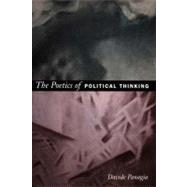The Poetics of Political Thinking
, by Panagia, Davide- ISBN: 9780822337188 | 0822337185
- Cover: Paperback
- Copyright: 2/28/2006
InThe Poetics of Political ThinkingDavide Panagia focuses on the role that aesthetic sensibilities play in theoristsrs" evaluations of political arguments. Examining works by thinkers from Thomas Hobbes to Jacques Ranciegrave;re, Panagia shows how each one invokes aesthetic concepts and devices, such as metaphor, mimesis, imagination, beauty, and the sublime. He argues that it is important to recognize and acknowledge these poetic forms of representation because they provide evaluative standards that theorists use in appraising the value of ideas-ideas about justice, politics, and democratic life. An investigation into the intertwined histories of aesthetic and political accounts of representation-such as Panagia presents here-sheds light on how modes of poetic thinking delimit the questions of unity and diversity that continue to animate contemporary political theory.Panagia not only illuminates the structure of much contemporary political theory but also shows why understanding the poetics of political thinking is vital to contemporary society. Drawing on Gilles Deleuzers"s critique of negation and his privileging of paradox as the source of political thought, Panagia suggests that a non-teleological concept of difference might generate insight into pressing questions about foreignness and citizenship. Turning to the liberal/poststructural debate that dominates contemporary political theory, he compares John Rawlsrs"s concept of justice to Ranciegrave;rers"s ideas about political disagreement in order to demonstrate how, despite their differences, both thinkers comprehend aesthetic and moral reasoning as part and parcel of political writing. Considering the writings of William Hazlitt and Juuml;rgen Habermas, he describes how the essay has become the exemplary genre of what is considered rational political argument.The Poetics of Political Thinkingis a compelling reappraisal of the role of representation within political thought.







